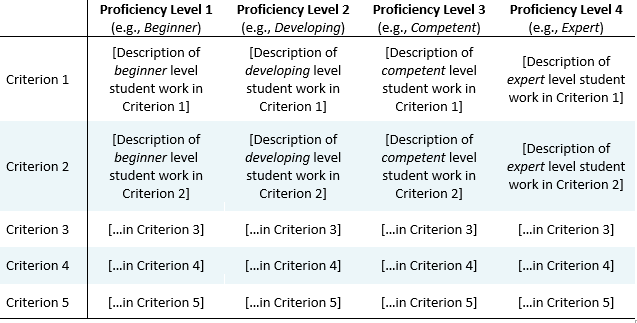Step 4: Design Assessment Tools
After establishing your long-term plan for PLO assessment (Step 3), your next task is to create an assessment rubric—this is the tool that faculty will use to evaluate student work. Creating effective and valid assessment rubrics is absolutely crucial in order for PLO assessment to provide useful and actionable results.
First, you will need to come up with a list of specific skills—also known as “criteria”—that capture your PLO of interest. These skills should also make sense given the specific courses and assignments that you selected in your PLO assessment plan. For example, if your PLO of interest is written communication skills and you are planning to assess students’ research papers, you might include idea development, use of texts/sources, clarity & organization, English language mechanics, and APA formatting as criteria in your assessment rubric.
For each criterion on the rubric, you will need to describe how student work would look at different levels of proficiency. The more specific and detailed these descriptions, the more useful they will be to you. For this reason, it is extremely important to have someone on your rubric development team who is very familiar with student work and able to describe the typical strengths and weaknesses that show up in these types of products.
In the end, your assessment rubric will look similar to this:

Tips:
-
There are plenty of sample assessment rubrics available online. However, we generally recommend that you not start with a generic rubric, as a poorly conceived one can quickly lead you astray! Instead, start with your ideas of what specific, demonstrable skills constitute mastery of the PLO.
-
We have specialists on the Assessment Team who are available to help you develop and refine your program’s assessment rubric. Please contact Anna Sher at asher@ucsc.edu to arrange a consultation.
Rubric Examples:
Undergraduate:
-
Reading texts (First-year undergrad)
-
Written communication skills (Humanities/Social Sciences)
-
Oral presentation skills (PBSci)
Graduate:
-
Scholarly writing (Humanities/Arts PhD)
-
Expertise in application area (Engineering)
- Independent research skills (Engineering)
Resources:
Once you have finished designing your assessment rubrics, the next step is to collect data (Step 5).

